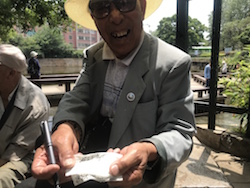All That's Buried
Our last stop in China was the desert--an oasis town called Dunhuang, towards the northwestern edge of the Gansu province, which (just east of Xinjiang which is where the Uighur re-education camps you might have heard about on the news are). We chose Dunhaung because we both had desert dreams and the Silk Road stop popped up in Lonely Planet algorithms, and Lee found a cheap flight to get us there. Flying in early from Xi'an, we came over dramatic snow-capped mountains and landed in a tiny airport under a brown sky--not smog as we had grown accustomed to, but sand. We tried to walk around but shops were shuttered, nothing was where we thought it would be. That afternoon we found refuge in the Mogao Caves, a most magnificent site of Buddhist carvings, housed in thousands of caves carved out by Buddhist hopefuls looking for some kind of peace in the desert hustles of Silk Road days and only one century ago rediscovered. Heavily protected, we were guided around the site in our small tourist group, by a guide in a large hat, a mask across her face, long sleeves, a long skirt who wielded up her tiny flashlight beam to show us the magnificent colors, characters, and scenes as she unlocked each of the eight caves we huddled into. (Tour in Chinese and so we followed along and made the stories up based on what we knew from the amazing film we'd seen in HD at the visitor's center.) Pictures weren't allowed in there, so you'll just have to imagine (or look it up). We saw so many Buddhas and their accompanying characters on our trip but there was truly nothing like these: their facial features, from agony to exhilaration, their vibrant colors, their hiddenness...on an adventure of amazing historical/tourist sites, this might have been the most. And afterwards, I traipsed my way ever so slowly up to the peak of the Singing Sand dunes amazed at all that is buried in this life...a glided back down them sososo fast, with a shot of adrenaline to my heart...
There are some things I had wanted to show you but haven't. I couldn't quite show you the presence of state authority, the security cameras everywhere, the only guns we saw automatics on men in teams loading up cash machines, the metal detectors at every subway station, the eye-scans and fingerprint machines, the gun-less police officers with their people prods laying against the wall, on display, the statue-still officers at Tiananmen Square, the signs everywhere telling you what not to do, the constant reminders about prohibitions posted in hotels, in bathrooms, in stations, the translations so funny, so beyond the intention. And I forgot to show you the fruit--strawberries, yangmei, loquats, plums, peaches, apricots (which were all the rage in Dunhuang), with flavors and colors so sweet and perfect, stronger even than Lebanon, and I thought that place was the heaven of fruit...
Our last stop in China was Shanghai. The apartment was right where we left it, and feeling as familiar and strange as ever. In my last day there, while packing, saying goodbyes at school, erasing the data off my computer and phone, watching the bank man cut apart my cash card, seeing the demon baby statue at the little mall near home for the last time, having my last beer in the alley, I know that I didn't want to leave -- it was a feeling deep in my gut, a resistance until the moment that the stoic customs officer exit-stamped my visa (which was a day from expiration). And yet, also, it was time to go, that's true too. Left some big chunks of me in China; and now, on we go...



